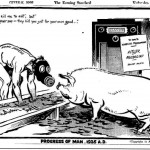 Historians of course consider and use political cartoons in different ways. You will have first come across them as GCSE standard when you looked at them as snapshot comments of the big issues of the day. There really excellent article here from the BBC on this issue. Lord Baker, a former Conservative education and home secretary, as well a party chairman, is something of an expert on the topic. He has a theory that political cartooning is in itself of historical note. He considers it to be a British invention, and argues that it helped us to avoid revolution, stating that “if you can laugh at your rulers, you don’t cut off their heads”…”Laughter is an escape for those kinds of pent up feelings. It helps make society calmer.”
Historians of course consider and use political cartoons in different ways. You will have first come across them as GCSE standard when you looked at them as snapshot comments of the big issues of the day. There really excellent article here from the BBC on this issue. Lord Baker, a former Conservative education and home secretary, as well a party chairman, is something of an expert on the topic. He has a theory that political cartooning is in itself of historical note. He considers it to be a British invention, and argues that it helped us to avoid revolution, stating that “if you can laugh at your rulers, you don’t cut off their heads”…”Laughter is an escape for those kinds of pent up feelings. It helps make society calmer.”
Perhaps. Or perhaps it was the freedom of speech required for political cartooning to flourish that helped us avoid revolution. In others words it was more of a product of political toleration than a cause of it. What is clear is that when Lord Baker was an active politician in the 1980s and early 1990s he took Spitting Image depicting him as a slug (Youtube it) with good grace. Read the article and see what you think.
If you are interested in political cartoons come you may like to know that there is the Cartoon Museum in London (off Little Russell Street). You might also to look at the archive of the incredible Steve Bell’s work for the Guardian (go to www.belltoons.co.uk). In addition, I have an unhealthly large collection of books on many aspects of the topic which you are welcome to borrow.
Finally, if you did do GCSE History with us you will be well aware of the work of David Low. Famed for his early and forthright attacks on the European dictators. There is a very brief collection of some of his work here. Low was so hated by Hitler that his name was on the black book of people to be immediately arrested after the successful invasion of Britain. The image above is a less well known piece of his work; but it is one of my favourites. Entitled “Progress of Man, 1935” it is visually striking, with a pig and a naked gas masked man feeding at the trough of nationalism. The pig is pitying the man, saying “they kill me to eat. But you poor sap – they kill you for your own good.”
It is a comment that still resonates 77 years later.
Mr Kydd.



